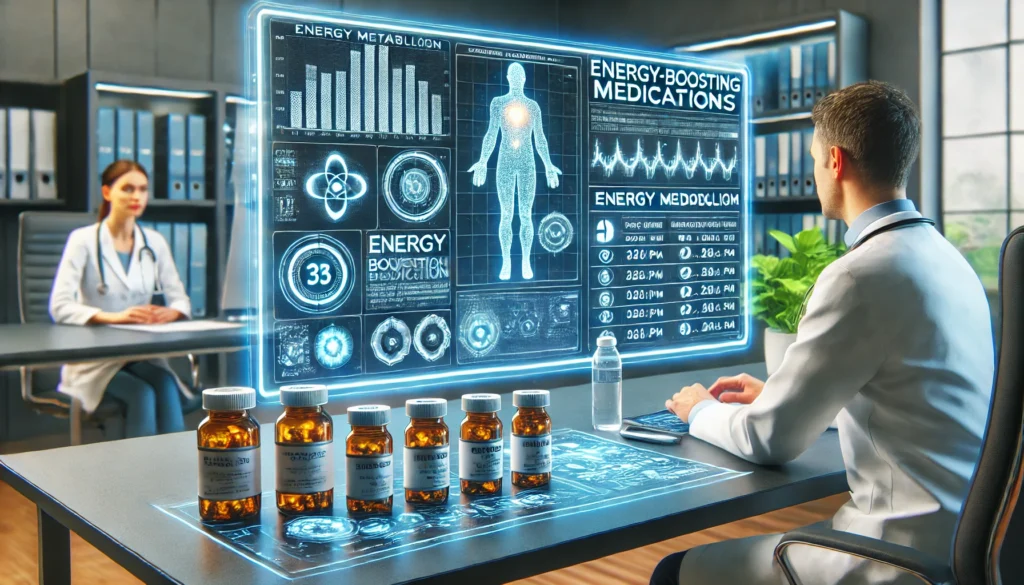The quest for energy is not new. Throughout history, humans have sought various means to enhance physical and mental stamina. From ancient herbal concoctions to modern pharmaceuticals, the journey has been both fascinating and complex. Today, the market offers a plethora of options, from prescribed energy pills to over-the-counter supplements, all promising to elevate energy levels and improve focus.
You may also like: Top Memory Supplements to Combat Dementia
The Historical Context
Historically, energy enhancement has been intertwined with cultural practices and traditional medicine. For instance, ancient Chinese medicine utilized herbs like ginseng, known for its invigorating properties. Similarly, South American cultures revered coca leaves for their stimulating effects. These traditional practices laid the groundwork for contemporary scientific exploration into energy-boosting substances.
Cultural Influences on Energy Enhancement
Different cultures have contributed unique perspectives and substances to the realm of energy enhancement. In India, Ayurvedic practices have long emphasized the use of adaptogens like ashwagandha for boosting vitality. In the Middle East, black seed oil has been a staple for enhancing energy. Understanding these cultural influences can provide valuable insights into how different societies approach energy augmentation.
Evolution of Modern Solutions
As scientific understanding advanced, so did the methods for energy enhancement. The 20th century saw a surge in the development of synthetic drugs designed to combat fatigue and improve mental acuity. This era marked the beginning of a more systematic exploration of the biochemical pathways involved in energy production and alertness. Today’s energy-boosting solutions are a blend of ancient wisdom and modern science, offering a broad spectrum of options tailored to individual needs.
Types of Energy-Boosting Medications
Modern medicine offers a range of prescription drugs designed to combat fatigue and enhance alertness. These medications are typically prescribed for specific medical conditions but are sometimes used off-label for their energy-boosting properties.
Prescription Energy Pills
1. Modafinil: Originally developed for narcolepsy, Modafinil is known for its ability to promote wakefulness and cognitive enhancement. It is often used by individuals seeking to maintain prolonged focus and alertness.Modafinil works by altering the levels of certain neurotransmitters in the brain. It is considered a eugeroic, meaning it promotes wakefulness without the jitteriness associated with traditional stimulants. Users often report increased motivation and reduced fatigue, making it a popular choice among students and professionals.
2. Amphetamines: Commonly prescribed for Attention Deficit Hyperactivity Disorder (ADHD), medications like Adderall and Dexedrine are known to increase energy and concentration. These drugs stimulate the central nervous system, enhancing both mental and physical performance.
Amphetamines function by increasing the release of dopamine and norepinephrine, which are crucial for attention and energy regulation. While effective, they come with a risk of dependency and side effects, such as increased heart rate and anxiety. Careful medical supervision is essential when using these medications.
3. Methylphenidate: Another ADHD medication, known by brand names such as Ritalin and Concerta, methylphenidate is used to improve attention and reduce fatigue.
Methylphenidate acts as a central nervous system stimulant, increasing dopamine and norepinephrine activity in the brain. It is often chosen for its efficacy in improving focus and reducing impulsivity. However, like other stimulants, it requires monitoring to prevent potential side effects and misuse.
Over-the-Counter (OTC) Energy Medications
While prescription drugs are potent, many prefer OTC options due to their accessibility and perceived safety.
1. Caffeine: The most widely consumed psychoactive substance globally, caffeine, found in coffee, tea, and energy drinks, is renowned for its ability to boost energy and alertness. Caffeine pills are also available for those who prefer a more concentrated dose.
Caffeine works by blocking adenosine receptors in the brain, delaying the onset of fatigue and promoting alertness. Its popularity stems from its immediate effects and widespread availability. Despite its benefits, excessive consumption can lead to jitteriness and insomnia, requiring moderation.
2. B Vitamins: Known for their role in energy metabolism, B vitamins are often included in energy supplements. They aid in converting food into usable energy.
B vitamins, particularly B12 and B6, are critical for maintaining energy levels and supporting nervous system health. They facilitate the conversion of carbohydrates into glucose, the body’s primary energy source. Regular intake of these vitamins can help sustain energy throughout the day.
3. L-Theanine: Often combined with caffeine, this amino acid found in tea can promote relaxation without drowsiness, enhancing the caffeine’s positive effects.
L-Theanine promotes alpha brain wave activity, associated with a state of relaxed alertness. When paired with caffeine, it helps smooth out the stimulant’s effects, reducing jitteriness and improving focus. This combination is favored by those seeking a balanced energy boost.

The Science Behind Energy Boosters
The efficacy of energy-boosting medications and supplements largely depends on their impact on the central nervous system and energy metabolism. Here’s how some popular options work:
Mechanisms of Action
- Neurotransmitter Modulation: Many prescription medications, like amphetamines, increase the levels of neurotransmitters such as dopamine and norepinephrine, which play a crucial role in mood, motivation, and energy.
Neurotransmitters are chemical messengers that regulate various functions in the body, including mood and energy. By modulating these substances, energy-boosting drugs can enhance alertness and cognitive function. This mechanism is particularly effective in managing conditions like ADHD and narcolepsy.
- Adenosine Receptor Blockage: Caffeine works by blocking adenosine receptors in the brain, preventing the onset of drowsiness and promoting alertness.
Adenosine naturally accumulates in the brain during waking hours, promoting sleepiness. By inhibiting its action, caffeine prolongs wakefulness and reduces fatigue. Understanding this mechanism explains why caffeine is so effective in enhancing short-term energy and focus.
- Cognitive Enhancements: Some substances, like Modafinil, are believed to enhance cognitive functions by increasing the availability of neurotransmitters and modulating brain activity.
Cognitive enhancement involves improving functions such as memory, attention, and problem-solving. Modafinil and similar compounds can alter brain activity patterns, leading to improved cognitive performance. These effects are particularly beneficial in demanding mental tasks.
The Role of Energy Metabolism
Energy-boosting supplements often target metabolic pathways to enhance energy production. By optimizing the conversion of nutrients into energy, these products can provide sustained energy levels. This approach is particularly useful for individuals with chronic fatigue or those seeking a natural energy boost.
The Impact on Brain Function
Energy boosters can significantly affect brain function, influencing everything from mood to decision-making. Enhancing neurotransmitter activity can lead to improved mental clarity and motivation. However, these effects vary depending on the substance used and individual differences.
Considerations and Potential Risks
While energy-boosting medications and supplements can provide significant benefits, it’s essential to approach them with caution. Over-reliance and misuse can lead to adverse effects, including dependency, cardiovascular issues, and mental health disturbances.
Safety and Efficacy
- Prescription Regulations: It’s critical to use prescription medications under medical supervision to avoid potential side effects and ensure their appropriateness for your specific needs.
Prescription drugs are potent and can have significant side effects if misused. Physicians provide crucial oversight to ensure these medications are used safely and effectively. Regular check-ups can help manage any adverse reactions and adjust dosages as needed.
- Supplement Quality: The supplement industry is less regulated, which can result in variations in product quality. Choosing reputable brands and consulting healthcare professionals is advised.
Not all supplements are created equal; some may contain contaminants or ineffective ingredients. Researching brands and seeking products with third-party testing can ensure you’re consuming a quality supplement. Healthcare professionals can also provide guidance on safe and effective options.
- Individual Responses: People’s reactions to these substances can vary widely. What works for one person might not work for another, making personalized guidance invaluable.
Genetic factors, lifestyle, and overall health can influence how individuals respond to energy-boosting substances. Personalized assessments can help tailor an approach that maximizes benefits while minimizing risks. Consulting a healthcare provider can provide personalized insights and recommendations.
Potential Side Effects
Common side effects of energy-boosting drugs include insomnia, anxiety, and increased heart rate. Long-term misuse can lead to more severe health issues such as hypertension and mental health disorders. Awareness and preventive measures are key to minimizing these risks.
The Risk of Dependency
Certain energy-boosting medications, particularly stimulants, can be addictive. Dependency can develop when these substances are used regularly, leading to withdrawal symptoms upon cessation. Understanding this risk is crucial for responsible use.

Future Implications and Trends
As science continues to advance, the potential for new, more effective energy-enhancing solutions is promising. Emerging research in nootropics and biohacking techniques offers a glimpse into future possibilities.
Nootropics and Biohacking
Nootropics, often referred to as “smart drugs,” are gaining popularity for their cognitive-enhancing properties. Biohackers are at the forefront, experimenting with combinations of these substances to optimize mental and physical performance.
The nootropic market is expanding rapidly, with new compounds being developed and tested for their potential to enhance cognitive function. Biohackers are experimenting with these substances, often documenting their experiences online. This community-driven exploration is contributing to a growing body of anecdotal evidence and sparking scientific interest.
Personalized Medicine
The future of energy-boosting solutions lies in personalized medicine, where treatments are tailored to individual genetic profiles and lifestyle factors, maximizing efficacy and minimizing risks.
Advances in genetics and biotechnology are paving the way for customized medical approaches. By analyzing an individual’s genetic makeup, healthcare providers can develop personalized treatment plans that optimize energy levels while minimizing side effects. This approach holds promise for creating more effective and safer energy-boosting strategies.
The Role of Technology
Technology is playing an increasingly significant role in energy enhancement. Wearable devices and apps can track energy levels and provide insights into how lifestyle changes impact energy. This data-driven approach can help individuals make informed decisions about their energy-boosting strategies.

Conclusion
In the pursuit of energy and productivity, medications and supplements offer valuable tools. However, it is vital to remain informed and cautious in their use, considering both historical context and modern scientific findings. By balancing scientific facts with practical advice, individuals can harness these solutions to enhance their well-being effectively.
With continued research and a thoughtful approach, the future of energy-boosting medications and supplements holds immense potential for those seeking to optimize their mental and physical health. As the field evolves, staying informed and adaptable will be key to maximizing the benefits of these advancements.
Further Reading:
Medications and supplements that can raise your blood pressure
10 Ways to Boost Your Energy in 10 Minutes or Less
What Medicines Treat Chronic Fatigue Syndrome?
Important Note: The information contained in this article is for general informational purposes only, and should not be construed as health or medical advice, nor is it intended to diagnose, prevent, treat, or cure any disease or health condition. Before embarking on any diet, fitness regimen, or program of nutritional supplementation, it is advisable to consult your healthcare professional in order to determine its safety and probable efficacy in terms of your individual state of health.
Regarding Nutritional Supplements Or Other Non-Prescription Health Products: If any nutritional supplements or other non-prescription health products are mentioned in the foregoing article, any claims or statements made about them have not been evaluated by the U.S. Food and Drug Administration, and such nutritional supplements or other health products are not intended to diagnose, treat, cure, or prevent any disease.


